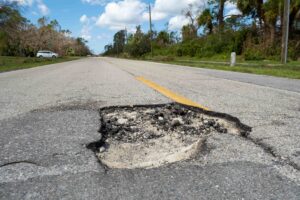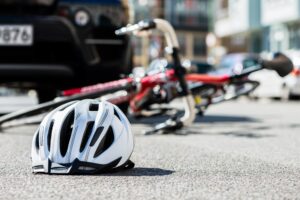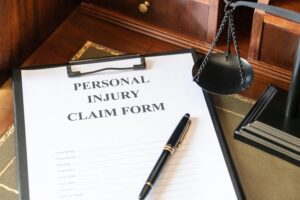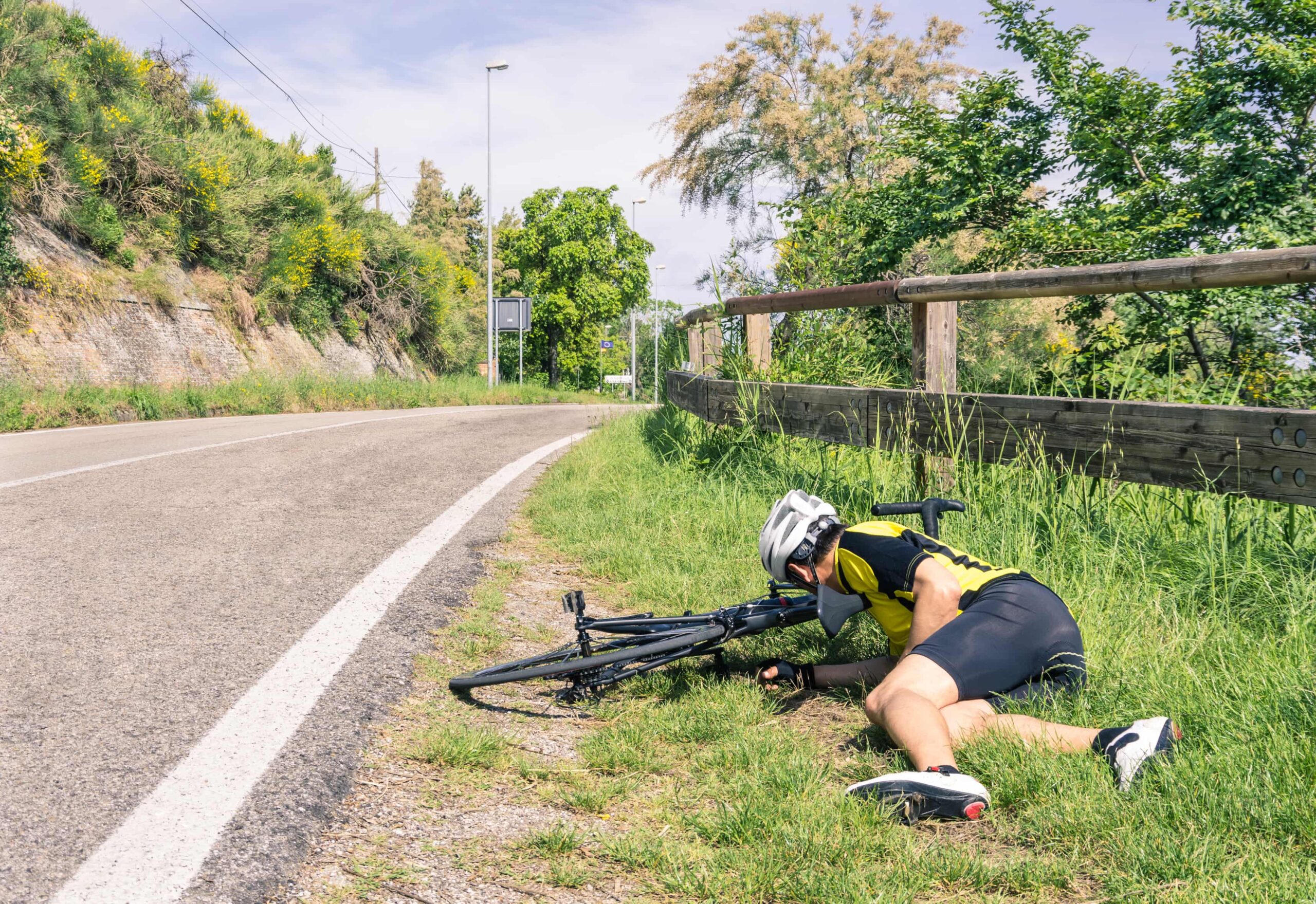Roadway hazards in West Virginia, such as potholes, debris, uneven surfaces, and poor road markings, are common causes of bicycle accidents. These hazards can make cycling dangerous, especially when they are not properly maintained or marked. Cyclists who encounter these hazards may fall, collide with obstacles, or lose control of their bikes, leading to serious injuries.
If you suffered an injury due to a roadway hazard, a skilled bicycle accident attorney in West Virginia can take legal action on your behalf. They will investigate the cause of your accident, gather evidence, and determine if a government agency, contractor, or private property owner was negligent. An experienced attorney will fight for fair compensation to cover your medical expenses, lost income, and other related losses.
Common Road Hazards that Cause Bicycle Accidents in West Virginia

In West Virginia, cyclists often face various road hazards that can lead to accidents, many of which result from others’ negligence. These hazards range from poor road conditions to improper behavior by other drivers and infrastructure issues.
One common road hazard is potholes and uneven road surfaces. West Virginia’s hilly terrain and frequent weather changes contribute to road degradation, creating potholes and cracks that are especially dangerous for cyclists. A cyclist riding over a pothole can lose control, causing a fall or even a serious collision with other traffic.
Debris on the road is another significant hazard. Items such as fallen branches, rocks, gravel, or broken glass can be particularly hazardous for cyclists who rely on a smooth, predictable surface. A cyclist who hits debris may skid or swerve unexpectedly, increasing the risk of an accident.
The lack of proper signage and lane markings is also a frequent issue. In some areas, roads may lack clear bike lane markings or warning signs, forcing cyclists to ride in traffic lanes without adequate space. This can lead to dangerous situations – especially in areas with high traffic volume or sharp curves, where drivers may not expect cyclists.
Speeding and aggressive driving near cyclists is another dangerous behavior that contributes to accidents. When drivers do not slow down or give enough space when passing cyclists, it can result in dangerous situations. Cyclists are particularly vulnerable because they lack the protective features that enclosed vehicles offer.
Lastly, sharp turns and blind curves in West Virginia’s mountainous areas present additional risks. Careless drivers may not anticipate the presence of cyclists, increasing the likelihood of accidents.
Types of Injuries in West Virginia Bicycle Accidents Resulting from Roadway Hazards

Bicycle accidents in West Virginia can cause a variety of injuries. One of the most common injuries in bicycle crashes is road rash, which occurs when a cyclist falls and slides across the pavement. This can lead to painful scrapes and abrasions, typically on the arms, legs, and face. Road rash can be serious if it involves deep cuts or if the skin becomes infected.
Another frequent injury is fractures, particularly in the arms, legs, wrists, and collarbones. Cyclists often try to break their fall by extending their arms, which can result in broken bones. In more severe accidents, a cyclist may suffer compound fractures, where the bone breaks through the skin, requiring immediate medical attention and surgery.
Head injuries, including concussions and skull fractures, are among the most serious types of injuries cyclists can sustain. Even if a cyclist wears a helmet, a powerful impact can still lead to significant brain trauma. Concussions may cause headaches, dizziness, confusion, and even long-term cognitive issues if not properly treated.
Cyclists are also vulnerable to spinal injuries, which can result in partial or full paralysis. A sudden impact, such as hitting a pothole or falling off the bike, can lead to a jolt to the spine, damaging vertebrae or nerves. These injuries may require extensive rehabilitation or even lifelong care, depending on their severity.
Internal injuries are also a risk, especially when a cyclist is struck by a vehicle or falls in such a way that their torso absorbs the impact. Internal bleeding or damage to organs like the lungs or liver can be life-threatening and require immediate medical intervention.
Lastly, soft tissue injuries like sprains, strains, and ligament tears are common in bicycle collisions. These injuries can result from sudden impacts or from the body twisting in unnatural ways during a crash. While they may not always be as visible or severe as fractures or head injuries, they can still cause significant pain and mobility issues.
How to Prove that a Road Hazard Caused Your Bike Accident in West Virginia
Proving that a road hazard caused your bicycle accident in West Virginia can be a complicated process, but with the right evidence, it’s possible to establish a clear connection between the hazard and your crash. A skilled bicycle accident attorney can be crucial in gathering and presenting this evidence effectively.
The first step in proving that a road hazard caused your accident is to gather photographs of the scene immediately after the crash. If possible, obtain pictures of the hazard, such as a pothole, debris, or poorly marked road conditions. Photographs should capture the hazard from multiple angles, showing its size, location, and proximity to the crash site. It’s also important to take pictures of your bicycle and any damage it sustained, as well as your injuries.
If there were any witnesses to the accident, their statements can be very helpful. A skilled attorney will know how to track down witnesses who can testify about what happened. They may have seen you swerving to avoid a hazard or falling because of a road defect. These eyewitness accounts can significantly strengthen your case.
Medical records are also an essential part of proving your claim. A doctor’s diagnosis and the treatment you received for your injuries can link your physical harm directly to the accident resulting from the road hazard. For example, if you sustained broken bones, cuts, or head injuries from falling off your bike due to a pothole, your medical records can show how the accident happened and what the injuries entail.
Another critical aspect is maintenance records of the road where the accident took place. A skilled bicycle accident lawyer will gather these records to show whether the road hazard had been previously reported and whether the local authorities were negligent in failing to repair or warn about it. If the hazard had been present for a long time without any attempts at fixing it, this may prove that the road conditions contributed to the crash.
Finally, a traffic engineer or expert witness can be crucial in explaining how the road hazard contributed to your accident. These professionals can evaluate the road and give their opinion on how those responsible for the road’s safety should have addressed the hazard.
A skilled bicycle accident attorney will know how to gather all of this evidence, build a strong case, and advocate for your rights, ensuring that you have the best chance of receiving fair compensation for your injuries.
Who Can be Responsible for a Bicycle Accident that Results from a Road Hazard in West Virginia?

In West Virginia, several parties may be liable for a bicycle accident resulting from a roadway hazard. These parties typically include government entities, private property owners, or contractors responsible for road maintenance and safety.
One of the primary parties that can be held liable is the government agency responsible for road maintenance. In West Virginia, local or state governments are tasked with maintaining roadways, ensuring that they are free of hazards such as potholes, debris, and other dangerous conditions. If a government agency fails to repair or adequately mark a known hazard, they may be found liable for the accident. This can include municipal, county, or state departments of transportation, depending on where the accident occurred.
If the hazard is located on a road that has not been properly repaired or maintained, it may be the fault of government negligence. For example, if a pothole or crack has been present for an extended period and the relevant authorities have not addressed it, they can be held responsible for any accidents resulting from the condition.
Another potentially liable party is a private property owner. In some cases, road hazards can exist on or near private property that affects cyclists. For example, a business or homeowner may be responsible for maintaining sidewalks or entrances that lead to a public road. If debris or other obstacles spill into the street due to the property owner’s negligence, they may be held liable if those hazards cause an accident.
Contractors hired by the government or private property owners to maintain or repair roads can also be held responsible. Contractors are often tasked with fixing road conditions such as paving, repaving, or clearing debris. If a contractor fails to meet safety standards or leaves behind a hazardous condition, they may be liable for any accidents resulting from their actions.
Lastly, in certain cases, designers and engineers who create road layouts may be liable if the design itself is inherently dangerous for cyclists. For example, poorly designed bike lanes or intersections can create risks that lead to accidents.
In any of these scenarios, the party responsible for maintaining or managing the roadway can be held liable for the injuries resulting from roadway hazards.
Damages You Can Receive for Your Bike Accident Injuries

If you are involved in a bicycle accident in West Virginia due to a roadway hazard, you may be entitled to compensation to cover the costs of your injuries and losses. The specific compensation you receive depends on the circumstances of the accident, the severity of your injuries, and who is found liable. Here are some of the most common compensable losses for which you can pursue compensation.
- Medical Expenses – One of the most immediate and important losses is your medical expenses. This can include costs for emergency treatment, hospital stays, surgeries, medications, physical therapy, and follow-up doctor visits. If your injuries are severe, you may need long-term care, such as rehabilitation or home health services. Compensation for medical expenses ensures that you don’t have to bear these financial burdens due to someone else’s negligence.
- Lost income – If your injuries prevent you from working, you may be entitled to compensation for lost income. This includes the income you lose while recovering from your bicycle accident and any future earnings you may miss out on if your injuries prevent you from returning to your job – or if you are forced to work fewer hours. In cases of permanent disability, you can also receive compensation for loss of earning capacity.
- Property Damage – If your bicycle or other personal property was damaged or destroyed in the accident, you may be entitled to compensation for property damage. This can cover the cost of repairing or replacing your bicycle and any other items, such as clothing or accessories, that were damaged during the crash.
- Pain and Suffering – Pain and suffering is a type of loss that addresses the physical and emotional toll the accident has on your life. This can include chronic pain, emotional distress, anxiety, depression, and the loss of enjoyment of life. While this type of loss is more subjective, a skilled attorney can help demonstrate how the accident has affected your mental and emotional well-being.
- Wrongful Death – In the unfortunate event that a bicycle accident results in death, wrongful death compensation may be available to the surviving family members of the victim. This can include compensation for funeral expenses, loss of companionship, loss of financial support, and the emotional effects of the loss.
- Punitive Damages – In some cases, if the at-fault party’s actions were particularly reckless or malicious, you may be eligible for punitive damages. These damages are supposed to punish the responsible party and prevent similar conduct in the future.
A skilled bicycle accident attorney can help you navigate the legal process and ensure that you receive fair compensation for your injuries and losses.
Speak with a Knowledgeable West Virginia Bicycle Accident Lawyer Today
If you recently sustained injuries in a bicycle crash that resulted from a roadway hazard in West Virginia, you should speak with a skilled personal injury attorney right away. An experienced bicycle accident lawyer will go over your legal options and determine a plan of action for your case.
You should always act promptly so your lawyer can investigate your accident circumstances and gather the appropriate evidence while still preserved in order to pursue the compensation you need via a claim or lawsuit.
Jeffery Robinette was admitted to practice law in 1991 and is licensed in all levels of state and federal trial courts in West Virginia. Mr. Robinette is also licensed in all state and federal appeals courts in West Virginia and the United States Supreme Court. As a National Board Certified Trial Attorney who has handled hundreds of motor vehicle, injury, and construction defect claims and a leading author on insurance claims settlement issues and difficulties in West Virginia, Jeff Robinette is uniquely qualified to represent your best interest.





